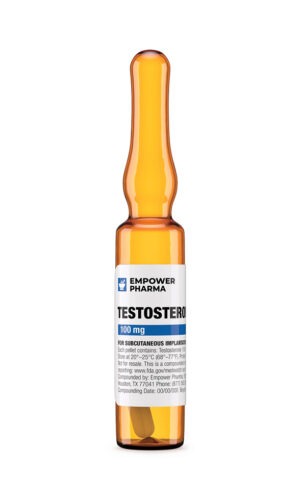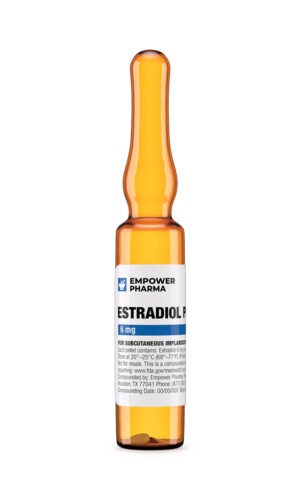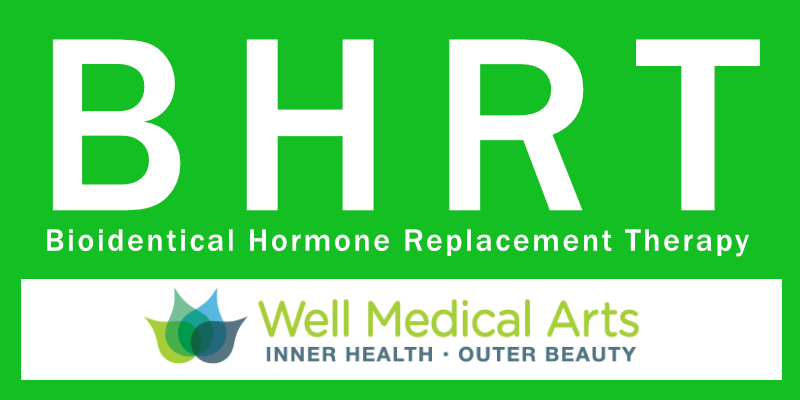Are you pre or post menopausal? We can help you keep feeling yourself with Bio-Identical Hormone Replacement Therapy(BHRT).
Bioidentical Hormone Replacement Therapy (BHRT) can balance hormone levels that become upset or deficient through lifestyle habits and/or aging. Unlike conventional HRT, BHRT is derived from plant sources and structured similarly to hormones circulating in the body. Since the bioidentical hormones are recognized in the body, they are more effectively assimilated and used. BHRT replenishes the body with the healthy hormone levels your body needs to function optimally. Forms of BHRT include progesterone, estrogen, and testosterone. For optimal treatment outcomes we recommend pelleting as our preferred method of dosing.

Bioidentical hormones are most commonly prescribed to treat symptoms of hormonal imbalance in women and men, such as hot flashes, night sweats, loss of libido, fatigue, weight gain, mood swings, and irritability. Some other benefits of using bioidentical hormones include:
- Much Improved libido
- Reduces vaginal dryness
- Menopause symptoms may go away
- Improved sleep
- May increases stamina, energy and endurance
- Better mood, concentration and memory
- Reduced risk of osteoporosis and improved bone density
- May help decrease inflammation and joint pain
- Reduced incidence of hot flashes and vaginal dryness
- Better maintenance of muscle mass and strength
- Improved cholesterol levels
- Reduced risk of endometrial and breast cancer
- Reduced risk of depression
- Reduced risk of Alzheimer’s disease
VIDEO TRANSCRIPT
0:00:00.719,0:00:05.279
hey it’s dominique well from well
0:00:02.320,0:00:08.240
medical arts i wanted to make sure that
0:00:05.279,0:00:10.000
you guys knew about one of the
0:00:08.240,0:00:11.599
most beneficial treatments that we have
0:00:10.000,0:00:13.040
many people don’t know we do it so here
0:00:11.599,0:00:15.360
i’m to tell you
0:00:13.040,0:00:16.960
perimenopausal symptoms are you
0:00:15.360,0:00:18.240
suffering from
0:00:16.960,0:00:19.840
headaches
0:00:18.240,0:00:23.600
mental fog
0:00:19.840,0:00:26.320
decreased energy stamina endurance some
0:00:23.600,0:00:29.519
weight gain especially around the abs
0:00:26.320,0:00:33.360
hot flashes night sweats of course
0:00:29.519,0:00:34.559
decreased libido dry skin dry hair dry
0:00:33.360,0:00:37.680
vagina
0:00:34.559,0:00:39.840
maybe even painless sex
0:00:37.680,0:00:41.440
anyways all of these are very treatable
0:00:39.840,0:00:43.600
and it’s really easy
0:00:41.440,0:00:46.399
come in for a wellness consult
0:00:43.600,0:00:48.320
we test all of your levels basic things
0:00:46.399,0:00:50.000
and then specific hormones check to see
0:00:48.320,0:00:52.879
if you’re still ovulating check your
0:00:50.000,0:00:54.719
estradiol progesterone testosterone see
0:00:52.879,0:00:56.640
what you’re low in combination of
0:00:54.719,0:01:00.000
looking at your symptoms looking at your
0:00:56.640,0:01:02.160
lab results we do the bio identical
0:01:00.000,0:01:03.760
hormone replacement therapy not the
0:01:02.160,0:01:06.880
regular western stuff that’s been
0:01:03.760,0:01:08.720
associated with increased cancer
0:01:06.880,0:01:10.880
incidents in particular
0:01:08.720,0:01:12.720
breast or uterine cancer these are
0:01:10.880,0:01:15.360
different for example the progesterone
0:01:12.720,0:01:17.680
is made out of mexican wild yam
0:01:15.360,0:01:19.680
the testosterone has not been associated
0:01:17.680,0:01:21.280
with it with any cancer
0:01:19.680,0:01:23.600
so we test your levels we see what
0:01:21.280,0:01:25.040
you’re deficient in usually start with
0:01:23.600,0:01:26.400
the just the progesterone and the
0:01:25.040,0:01:28.720
testosterone
0:01:26.400,0:01:31.360
many times the estrogen the estradiol is
0:01:28.720,0:01:32.640
not needed at all
0:01:31.360,0:01:34.960
so if you’re
0:01:32.640,0:01:36.799
suffering from any of those symptoms or
0:01:34.960,0:01:38.799
just about there and feel like you want
0:01:36.799,0:01:41.040
to keep things good
0:01:38.799,0:01:43.200
come in for a wellness consultation
0:01:41.040,0:01:45.360
we’ll check your hormones let me tell
0:01:43.200,0:01:48.399
you after i do hormonal replacement
0:01:45.360,0:01:51.200
therapy on women we get phone calls
0:01:48.399,0:01:53.040
about how their life is changed we do
0:01:51.200,0:01:54.560
pre and post tests to say hey what are
0:01:53.040,0:01:56.079
your symptoms before what are your
0:01:54.560,0:01:59.200
symptoms after
0:01:56.079,0:02:01.360
people improve up to 13 different points
0:01:59.200,0:02:05.360
all the way from the mental down to the
0:02:01.360,0:02:07.600
sexual so people get so much benefit in
0:02:05.360,0:02:09.679
quality of life it’s amazing and i
0:02:07.600,0:02:11.440
wanted to make sure you knew about it if
0:02:09.679,0:02:15.239
you think you could be helped give us a
0:02:11.440,0:02:15.239
call we’re here for you
You may also call one of our patient care coordinators at 206-935-5689 and we will be happy to assist you in scheduling.
How we prescribe for Hormone Replacement therapy
Many compounding pharmacies specialize in producing BHRT. Doses are determined on an individual basis and available in different administrations (topical, oral and pellets). Fortunately, we specialize in age-management medicine and can help you determine which BHRT compounds are best for you. At Well Medical Arts we administer our BHRT in pellet form to ensure consistent dosages and ideal treatment outcomes.
When first starting Bio-identical Hormone Replacement Therapy blood tests are taken to determine hormone levels required to bring you back to optimal range. If there is a deficiency or imbalance, BHRT are recommended to safely balance hormone levels. Restoring hormone balance can provide greater protection from chronic diseases and alleviate menopausal symptoms. Saliva or serum testing of hormonal levels is used to determine the ideal levels to prescribe.
Learn more about Bioidentical Hormones: http://www.health.harvard.edu/womens-health/what-are-bioidentical-hormones
For many of our patients the most consistent and convenient form for testosterone delivery is through pellets. Instead of applying creams every day our client can come in every 3 months for women or every 4 months for men to have their testosterone pellets inserted. https://wellmedicalarts.com/testosterone/
You may also call one of our patient care coordinators at 206-935-5689 and we will be happy to assist you in scheduling.
Major Hormones of the Body and What They Do
Progesterone
Relaxation, feelings of well being and promotes sleep.
Progesterone is a key steroid hormone that is essential for production of the sex hormones in both men and women. Progesterone isn’t a sex hormone in itself, but is required for the ovaries to secrete estrogen and for the testes to secrete testosterone. Progesterone is also produced in the adrenal glands of both men and women. You might be surprised that in order to produce progesterone cholesterol is essential. Cholesterol is a fat, which is a precursor for progesterone, and progesterone is a precursor for Estrogen, Testosterone, DHEA and Cortisol. Cholesterol in the body is converted into Pregnenolone, which gets converted into Progesterone. It is very important that one has a healthy amount of the proper fats in order for our body to produce the hormones needed for the endocrine system to function optimally and for men and woman to grow into their full capacity.
Progesterone isn’t the hormone that causes the breast to develop or the testes to produce sperm, but is the hormone required for testosterone and estrogen to do their job. Progesterone is very influential in the functionality of the human body at all ages in respects to building bones, converting fat into energy, regulating blood sugar, maintaining and supporting a healthy libido and enhancing intelligence. It also plays an important role in the strength of the immune system and is a natural anti-depressant.
Maintaining a proper balanced level of progesterone is important for both men and women. When progesterone is too low women experience symptoms of sleepiness, breast tenderness, weight gain and head aches all affected by the thyroid gland not being able to perform optimally because of the low levels of progesterone. Men with low levels of progesterone can experience fatigue, hair loss, decrease in sex drive, weight gain, bone and muscle loss, depression, erectile dysfunction and even man boobs, technically termed Gynecomastia.
When we are consistently over stressed our adrenal glands can become fatigued, because cortisol levels are at a steady “fight or flight” response, which they are reserved for in times of serious emergency. When we over activate the adrenal system we drain the progesterone levels, which is the precursor to cortisol. Managing our stress so that we have a balanced and stable life does
more for us than we might realize. Our endocrine system is an entire ecological world in and of its self and cultivating harmony within this internal system is essential for a healthy body, mind and spirit.
Estrogen
Reduce hot flashes and night sweats
When we think of Estrogen we usually reference this hormone to the female reproductive system. But in fact estrogen is produced in both men and women just at different amounts.
There are three different varieties of estrogens, which are: Estrone (E1), Estradiol (E2) and Estriol (E3). Estrone (E1) is produced in small amounts in men and women in the adrenal glands and adipose tissue, which is fat, where it is also stored. Estradiol (E2) is the hormone specifically responsible for most of the estrogen activity. In men it is produced in the testes and adrenal glands and in women it is produced in the ovaries. This form of estrogen is synthesized from the androgen testosterone. Estriol (E3) is the form of estrogen most abundant during pregnancy and is produced by the placenta.
Estrogens play a key role in the communication of cells and the formation of genes. If the levels of estrogen are out of balance the receptors are not able to successfully receive or process the message to perform very important functions.
In women Estrogen has a great responsibility in tending to the reproductive organs including vagina, ovaries, fallopian tubes, utter and mammary glands found in the breasts. The estrogen found in the ovaries helps to stimulate the pituitary gland, which sends a signal to the brain to release hormones to aid in follicle development. The egg then travels down the fallopian tubes by way of muscular contractions, which estrogen is responsible for safely transporting the egg into the uterus. Estrogens provide the adequate amount of mucosal secretions lining the uterine wall as well as the cervix in the vagina to aid in ease of transport of the sperm.
Estrogens are the hormones that influence the formation and bone structure in women. Estrogen influences the narrower shoulders, broader hips, shorter bones and softer contour of tissue around the muscles and in the breasts giving women a distinctive form. Estrogen also affects the pitch of the voice in women. The voice box is smaller and hair is finer and more prominent on the head and less on the body than men.
In men estrogen also helps with the development of the male reproductive system. Specific characteristics being a deeper voice, greater amount of body hair, longer and stronger bones, growth and maturation of sperm as well as muscle development. Estrogen also influences the regulation of the heart rate and the function and development of the brain. If the levels of estrogen in men are too high they can experience a wide array of negative symptoms; increased weight gain, male boobs, loss of muscle mass and sex drive just to name a few. The more fat a man has accumulated around the mid section will create an environment where greater levels of Aromatase are present and therefore a man will have greater levels of estrogen in the body.
Estrogen is a very specialized fat that plays a very important part in the development of the physical and sexual characteristics of men and women as well as reproduction. It is important to maintain the delicate balance of estrogen levels to ensure a system that is harmonious in its function. As we age estrogen increases in men due to the drop in testosterone and estrogen decreases in women causing the gradual cessation of ovulation, which comes with it great symptoms of discomfort. These don’t have to be endured, and can be managed with wisdom and attention to our unique hormonal levels.
Awareness of the importance of these hormones within your body and knowing their purpose and function is the first step to consciously taking charge of your health at a cellular level. This will have a lasting impact on your ability to thrive physically and enhance your emotional well being.
Testosterone
Cognition, energy, muscle mass, weight loss, good sleep
Like Estrogen, Testosterone is a very important hormone in the development, growth, and maintenance of both men and women. Women have lower levels than men, yet the delicate balance of testosterone in relationship to estrogen and progesterone is crucial for harmonious syncopation within the bodies systems allowing for a fully functioning person at all levels of health.
Testosterone is made possible because of its precursor cholesterol that is an androgen or sex hormone. Testosterone is the hormone most abundantly produced in the male testes and is the dominant male sex hormone responsible for the development of the sexual traits, organs and production of sperm. Hair follicles, prostate gland, and testes are some areas of the anatomy that are in greater relationship to testosterone. Testosterone gives men a distinct body frame, deeper voice, and course facial hair. It is also produced in women’s ovaries and adrenal glands and plays a role in lean muscle and bone strength, energy level, stability of mood, and desire for sex as well as sensitivity to pleasure. An important note, testosterone affects the level of arousal and sensitivity to stimulation of the nipples and clitoris.
There is a flip side to andropause, which is an issue of too much testosterone rather than a shortage. Symptoms of an over abundance of testosterone, which can be due to steroid use in athletes are liver disease, low sperm count, aggressive behavior, impotence, insomnia, heart muscle damage, and acne. High levels of testosterone increase the cholesterol level of the good HDL and bad LDL, which can cause heart disease and stroke. We can see how important individually tailoring your hormone levels can be to maintain a balanced whole body system. Testosterone plays an important role intricately working with estrogen in most of the body functions, each with its unique rhythm and beat.
DHEA-Adrenal Glands
On top of each kidney are these little triangular structures known as the adrenal glands. The adrenal gland has an outer region called the adrenal cortex that surrounds the inner region called the adrenal medulla. The adrenal cortex with the essential precursor of cholesterol secretes three types of hormones; which are cortisol, aldosterone, and testosterone.
DHEA stands for Dehydro iso andro osterone, what is that you might ask? Well, it is just this very important precursor to androgen hormones like estrogen, progesterone and testosterone produced in the Adrenal glands. The adrenal glands are responsible for regulation of water, salt, fat and carbohydrate metabolism. DHEA is a steroid that is found in women and men, but is the ingredient that gives men their unique masculinity and is also secreted in the testes. In woman DHEA is secreted by the adrenal cortex.
The adrenals not only produce DHEA, but cortisol, which is ‘fight or flight’ hormone. When we are too stressed the adrenals get fatigued and have a harder time producing DHEA and so the levels start to drop. It is common during the natural aging process for the levels to begin naturally dropping around the age of 30, but proper levels help improve memory, restore lean muscles mass, build greater endurance, decrease fat percentage, boost immunity, supports flexibility and helps increase testosterone levels. When DHEA is below the bodies proper levels symptoms such as depression, lack of libido, weakened immune system, fatigue, aching joints and a loss of muscle can occur.
DHEA is known to help age related issues such as improving poor memory, and preventing the early onset of Alzheimer’s disease.
This tiny hormone plays a very powerful role in the regulation and maintenance of our bodies system, functions and overall health and well-being. Living a life that is balanced means more than just taking a vacation once a year. It requires a daily attention and care to way we are in the world. When we are able to be calm and relaxed this state of being supports the adrenal glands in performing their proper function, which is to produce DHEA so that our testosterone, estrogen and progesterone levels are also in harmony.
Thyroid – Thyroid Gland
What does your Thyroid have to do with your hormonal health? Your Thyroid health affects every organ in your body. It regulates your metabolism of fat and carbohydrates as well as body temperature and heart rate. Your Thyroid is a gland located just below your Adams’ Apple and is in the shape of a butterfly. The Thyroid secretes T3 and T4 which are hormones containing iron.
Since your metabolism and heart rate and body temperature are some pretty major body functions that are vital to you being alive, it is important to know how to manage and maintain your thyroid balance. The pituitary and hypothalamus send messages to the thyroid telling it where the thyroxine levels are in the blood. When your thyroid levels get too low the pituitary gland produces TSH (thyroid stimulating hormone) to produce more thyroxine. This delicate dance between the thryroid and the pituitary gland is known as a feed back loop, which keep each other in check, as one decreases the other increases, just like testosterone and estrogen do in the body.
In a normal functioning thyroid T4 is converted to T3 and everything works great. When T4 is not converted to T3, which occurs with the natural aging process due to the decrease in the production of T4, we get an underactive thyroid known as hypothyroidism. Selenium is the mineral responsible for T4 not being converted to T3. Some other issues that affect thyroid health are: mercury toxicity, adrenal fatigue and over exposure to stress and estrogen mimics like plastics and parabeans, which suppress the thyroid function.
This little thyroid of ours can sure cause some havoc when out of balance. It is important to pay attention to your Adrenal Function when monitoring your thyroid, for treating thyroid without looking at the entire pathology of the endrocine system is like looking at a map through a pin-hole. Hypothyroidism is one of the most misdiagnosed and under treated disorders and is usually found in people over 40. A few of the symptoms that occur when the balance is disrupted; depression, weakened muscles, infertility, elevated cholesterol, poor memory, fatigue and increased risks of cancer. As well as decreased sex drive, light sensitivity, head-aches, insomnia, brittle hair and nails, dry skin, constipation, intense periods, bruising easily and recurrent infections.
Cortisol – Adrenal Gland
When was the last time you were scared out of your witts? Jumped out of a plane, or where only inches from being hit by that speeding car at an intersection? Perhaps your child almost ran out into the street or fell and got hurt. What do all these events have in common? Heart pounding, “fight or flight” responses. And cortisol is the hormone activated by the Adrenal Glands and is a stress hormone that protects you in times of danger.
We are in a constant state of stress due to high pressured jobs, overloaded schedules, trying to be and do all. This high stress life style leaves little time for unwinding, relaxing, breathing and just being. This can really take a toll on our mental functioning and relationships, but even more importantly our physical health.
With a consistent elevated level of cortisol the adrenals go into fatigue and overdrive burning up the reserves that are left for major life threatening situations. The more stress the higher the cortisol levels, which create insulin resistance. The body isn’t able to burn the carbohydrates as usual and stores them as fat instead. It seems pretty simple the more stressed one is the easier it might be to gain excess weight. Just because of being in a constant state of “flight or fight”. The elevated cortisol levels also contribute to diabetes, stroke, obesity, weakened immune system, heart disease as well as an impaired cognitive ability. How many people can think clearly when they are in “survival mode”? Our brains are programed to shift gears and preserve life, not attend to focusing on biochemistry or mathematics or normal body functions like digestion.
A nation of freedom seems to be enslaved to constantly go, do more, and be more. What are we doing to support lasting health and vitality and what can we do to decrease the stressors in our lives? And what is the type of life we want long term? One in which we are always in a state of worrying about our limited health that prevents us from having lasting relationships and lives we all desire? Now that we know about the importance of hormonal balance in our body and its intricate relationship to our lifestyle and overall wellbeing we can be aware of the health of our adrenal glands and take note if we are living in constant “flight or flight”.
Adrenaline – Adrenal Gland
Do you know the meaning of EMERGENCY? When we are under stress the Adrenal Glands produce Adrenaline. It is the chemical that gets our heart rate up, our blood pumping and provides higher levels of glucose and lipids in the blood to be used for emergency situations. There are two types of chemicals secreted during this emergency situation, which are Norepinephrine and Epinephrine. Norepinephrine constricts the majority of the blood vessels in the body while Epinephrine dilates the blood vessels in the liver and skeletal muscles each being prime movers for the contraction and speed of the heart.
There are certain people who experience this rush of adrenaline on a daily basis. They might be known as the busiest, get it done type of people who love the challenge, the deadline, accomplishing the impossible. This type of “adrenaline junky” would be the type of person with Adrenal Fatigue. But other factors such as diet, drugs, alcohol, over exercising, birth control pills, not eating regularly, insomnia, stress, eating high sugar foods, hormone imbalances and just being overworked also have a great impact on the health of the Adrenals and the over production of Adrenaline.
Insulin – Pancreas
The Pancreas produces two hormones that work very close together, which are glucagon and insulin. Insulin is the master of regulating carbohydrates, fat and protein metabolism. If we don’t have enough insulin we experience diabetes, which is characterized by high blood sugar levels and symptoms of dehydration and weakness. If we have an over production of insulin the blood sugar levels are too low, which creates convulsions, anxiety and weakness. Glucagon raises the levels of sugar in the blood and works very closely with insulin in its job of maintaining proper blood sugar levels in the body.
The cells in our body have receptor sites on them, specifically for insulin. When the insulin attaches to the cell it activates other receptors on the cell to absorb glucose-yes, sugar-from the blood. There are people who don’t make insulin naturally in the body. Without it one can be starving to death even thought they eat adequate amounts of food because the cells can’t ingest the glucose used for energy in the brain and the body. People who experience Type 1 diabetes don’t make insulin and need to get it through a pump or shots.
Craving carbohydrates is related to the level of insulin in our blood. When our insulin is low we crave carbohydrates. Women especially before their periods crave carbs even more because of the drop in estrogen levels. Lower estrogen levels create craving for carbs and the usual one is chocolate.
Melatonin – Pineal Gland
Did you ever wonder what causes you to fall asleep, stay asleep each night and awake in the morning? Did you ever think that it had to do with a hormone produced by a very tiny gland in the brain called the Pineal Gland? The more we discover about the power these hormones have the more we realize how important they are to supporting a healthy balance inside and outside of our body.
Melatonin may be more important than we might know. Melatonin is produced in the Pineal Gland found in the brain, as well as tiny amounts in the intestines and the retina. But what affects how much melatonin is produced? Light and dark which is detected by the retina in the eye. Light from the sun or daylight inhibits production of melatonin increasing feelings of alertness and wakefulness. Melatonin is stimulated when it is dark, which in turn decreases heart rate and body temperature preparing one to feel sleepy.
There are receptors for melatonin in the pituitary gland, intestinal tract, ovaries and blood vessels and they have an effect on our biological rhythms. Melatonin stimulates the release of female hormones and plays a big role in the onset, duration and intensity of the menstrual cycle. Melatonin also helps with mating and breeding responses in animals.
When you get regular restful sleep do you notice how calm and relaxed you are? Melatonin has a relationship with serotonin. Melatonin is synthesized from Tryptophan and is then converted into serotonin, which we know helps stabilize our moods. Getting to sleep before midnight has an important affect on the strength of your immune system and prolactin production. It is suggested that getting to bed by 9pm allowing 3 hours of sleep before midnight greatly improves your immunity and can add years to your life. Melatonin can do wonders for longevity because of its ability to counteract free radicals with its antioxidants.
When we are not sleeping well, are over stressed, traveling and working long hours we contribute to the drop in melatonin levels. The Pineal gland is very aware of the age of our body and as we do age it stops producing the same amounts of melatonin in preparation for death and decay. We can see how developing a healthy sleep pattern and life style in addition with balanced melatonin levels can enhance and support our immune system, rev up our vitality and help keep us feeling and looking young as we age and grow in wisdom.
Human Growth Hormone – Pituitary Gland
What does the human growth hormone do? Help you grow right? Did you know that if you have too much growth hormone as a child you would experience gigantism and if you have too little dwarfism is a result. The balance of the Human Growth Hormone in our body seems to be very important. Factors that affect the levels of the growth hormone in the blood are diet, exercise, emotional stress and sleep.
This hormone is a protein that is produced in the Pituitary gland, a pea sized gland within the brain and does its work at night after we are asleep sending surges of growth hormone into the blood that travels to the liver where it is converted into insulin. From the liver the insulin called IGF-1 acts as a messenger to initiate our body to grow cells, muscles, organs, bones and it also aids how the body metabolizes the food we eat.
Human growth hormone drastically drops by the age of 60 and some of the symptoms of HGH deficiency are fatigue, thinning bones, skin that thins, sags and begins to wrinkle, lowered immunity, decrease in libido, stamina and heart function as well as muscle and hair loss. A decrease in HGH also adds to symptoms of depression, anxiety and increased body fat percentage.
When people with low levels of Human Growth Hormone supplement their deficiency they can experience a magnificent full body change .The biggest being a leaner body shape. Their muscle mass increases, fat seems to melt away, the skin gets thicker and more elastic and bone density increases. And many feel that they have an overall greater sense of vitality and zest for life.
Because bioidentical hormone replacement therapy is considered cutting edge medicine, only a select group of doctors are experienced in BHRT and have experience through proven results using bioidentical hormone replacement therapy.
You may also call one of our patient care coordinators at 206-935-5689 and we will be happy to assist you in scheduling.




